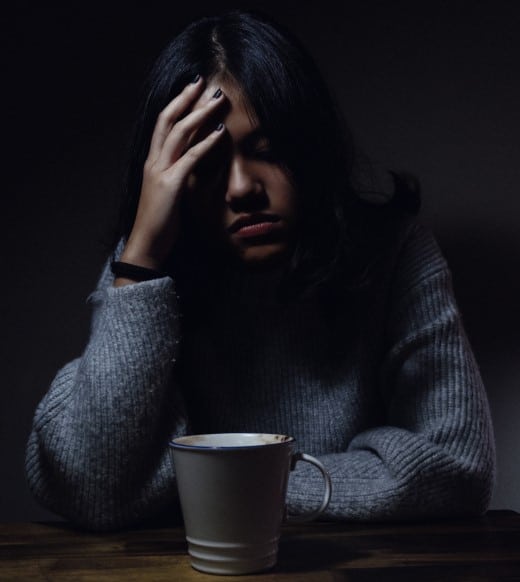
How to go to sleep when your mind won’t stop racing – 10 things to try
By Jason Wooden, PhD
You know you need to get rest, but instead you slowly watch the hours pass by.
Well, you’re in good company as there are some pretty impressive people who have done the same. Sir Isaac Newton, Benjamin Franklin, Vincent Van Gogh, and Winston Churchill all had battles with insomnia.
In fact, millions of people struggle with insomnia every night. For many, the culprit is stress and anxiety.
Strictly speaking, anxiety is a feeling of worry, nervousness, or unease.
Worldwide 1 in 3 people suffer from anxiety.
There are many reasons for a racing mind – everyday stress, worry about the future, or perhaps you’re get too excited about something cool happening the next day. You may also be feeling depressed or suffer from an anxiety disorder.
And sometimes you just get too wired up worrying about getting sleep…
Regardless of the cause, the impact of a runaway mind at bedtime is the same: an awful night and a long miserable day.
And we now know lots about what happens to you and your body when you’re sleep deprived. Your brain doesn’t work the way it’s supposed to which makes it hard to function at school or on the job.
If this happens night after night, then you put yourself at risk for other unwanted health issues such as high blood pressure, cardiovascular disease, obesity, depression, and dementia.
So, it’s really important to figure out how to go to sleep when you can’t stop your mind from racing.
Do you have an anxiety disorder?
- Feeling restless or on edge
- Easily fatigued
- Poor concentration
- Irritability
- Muscle tension
- Hard to stop worrying
- Sleep problems
Good News, You Have Options
Today, we know so much more about the connection between stress, anxiety, and sleep.
There is so much more you can do to help calm your mind so that you’re more relaxed for sleep:
1) Practice good sleep hygiene
Having a regular evening routine and calm environment can help you relax. However, you should also see a sleep specialist as an underlying sleep disorder may be making things worse. (Would you believe that 80 percent of sleep apnea cases in the US are undiagnosed?)
Sleep Hygiene Tips
- Keep consistent wake up and sleep times
- Avoid naps
- Exercise during the day
- Avoid large meals, alcohol, or stimulants such as caffeine before bedtime
- Maintain a regular bedtime routine
- Avoid using TVs, laptops, or other electronics before sleep
- Keep your sleep environment dark, cool, quiet, and relaxing
Sleep Hygiene Tips
- Keep consistent wake up and sleep times
- Avoid naps
- Exercise during the day
- Avoid large meals, alcohol, or stimulants such as caffeine before bedtime
- Maintain a regular bedtime routine
- Avoid using TVs, laptops, or other electronics before sleep
- Keep your sleep environment dark, cool, quiet, and relaxing
Sleep Hygiene Tips
- Keep consistent wake up and sleep times
- Avoid naps
- Exercise during the day
- Avoid large meals, alcohol, or stimulants such as caffeine before bedtime
- Maintain a regular bedtime routine
- Avoid using TVs, laptops, or other electronics before sleep
- Keep your sleep environment dark, cool, quiet, and relaxing
2) Write it down
3) Try white noise
4) Listen to calming music
5) Try visualization
6) Breathing exercises
7) Meditation
8) Yoga
9) Natural Supplements
10) Talk to your doctor
Summary: How to Go to Sleep With a Racing Mind
10 Ways to quickly relieve stress and anxiety before bed
A survival guide for people who can’t sleep after social events
How to go to sleep – some more things to try
More about sleep disorders and how they’re diagnosed
14 Natural Sleeping Aids Explained
5 reasons why you should sleep on it when making decisions
Connect with us:
About Us
Better Sleep Simplified® was founded as a place for you to get clear and well-researched information.
Our goal is to make sure you know about your options so that you take action sooner rather than later.
Check us out on YouTube:
Watch and Learn
Helpful sleep tips, interesting sleep facts and statistics you want to know about
Affiliate Disclosure
This site is a participant in the Amazon Services LLC Associates Program and other affiliate advertising programs designed to provide a means for sites to earn advertising fees by advertising and linking to them.
Important: BetterSleepSimplified.com is for informational purposes only and is not intended or implied to be a substitute for professional medical advice, diagnosis, or treatment. Always consult a physician for sleep and health concerns. See additional information.
